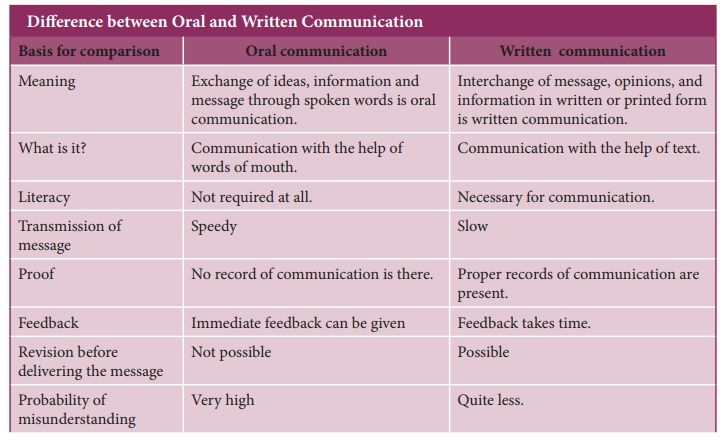Advantages and Disadvantages - Forms of Communication | 12th Office Management and Secretaryship : Chapter 7 : Leadership and Communication
Chapter: 12th Office Management and Secretaryship : Chapter 7 : Leadership and Communication
Forms of Communication
Forms of Communication
In a general
way, communication can be of three broad types- oral, written and nonverbal.
Verbal communication
The verbal
communication is a type of oral communication when in a message is transmitted
through the word spoken.
In oral or
verbal communications, information is given directly, either through face-to-
face or through telephone, mobile phones or office intercom. Meetings,
lectures, seminar, conferences, interviews are example of verbal communication.
There are some points for the oral communication which can be summed up as
follows:
·
Saves time and money
·
Provides personal touch
·
Tends to be more effective as the feedback can be received immediately
·
Doubts can be clarified on the
spot
·
Chances of understanding are
better
·
Provides greater flexibility
Disadvantages of Oral Communication
·
Oral communication suffers from some inherent limitations.
·
It is not always feasible (as in
the case of long
distances and sometime beyond the network services).
·
Not appropriate for lengthy or complicated conversation.
·
Not suitable for keeping records
·
It has no legal validity and hence
lead to problems in
certain situations.
·
May have chances of misunderstanding.
Non- verbal communication
It refers to
the clues we send to others all the time regarding our feelings and emotions,
either knowingly or unknowingly through our facial expressions, gestures and
body postures, emphasis and intonations on some words, and the physical
distance between the sender and receiver.
Advantages
·
The message of non verbal
communication reaches very fast and reduces the waste of time.
·
Non verbal cues of communication
like sign and
symbols can be communicated quickly than written or oral messages.
·
Helps illiterates people.
Disadvantages
·
Non verbal communication is vague because words or languages are not used.
·
Long conversation and necessary explanation are not possible.
·
It cannot be used at public tool
for communication.
·
In some cases it involves huge
cost. e.g. neon sign,
power point presentation etc. are very much costly compared to the other forms
of communication.
Written communication
It is a formal
method of communicating. It can provide more information to the receiver that
what is not possible in oral communication. Oral communications may take the
forms of reports, circular, memos, note, manual etc. writing is more reliable
than speech.
Advantages of written communication
·
Suitable for lengthy matters.
·
At times it might be the only
available form of
communication ( as in long distance transactions).
·
Can be maintained as a permanent record for later references.
Disadvantages of written communication
·
Time consuming and sometimes costly.
·
Has a greater chance of
mis-interpretation and misunderstanding.
·
Difficult to maintain secrecy.
·
Suffer from lack of flexibility.

Related Topics